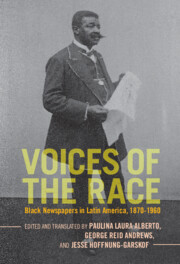Book contents
- Voices of the Race
- Afro-Latin America
- Voices of the Race
- Copyright page
- Dedication
- Contents
- Figures
- Acknowledgments
- A Note on the Text
- Introduction
- Chapter 1 Politics and Citizenship
- Chapter 2 Racism and Anti-Racism
- Chapter 3 Family, Education, and Uplift
- Chapter 4 Community Life
- Chapter 5 Women
- Chapter 6 Africa and African Culture
- Chapter 7 Diaspora and Black Internationalism
- Chapter 8 Arts and Literature
- Appendix Black Periodicals in Argentina, Brazil, Cuba, and Uruguay, 1856–1960
- Glossary
- Bibliography
- Index
Chapter 3 - Family, Education, and Uplift
Published online by Cambridge University Press: 25 August 2022
- Voices of the Race
- Afro-Latin America
- Voices of the Race
- Copyright page
- Dedication
- Contents
- Figures
- Acknowledgments
- A Note on the Text
- Introduction
- Chapter 1 Politics and Citizenship
- Chapter 2 Racism and Anti-Racism
- Chapter 3 Family, Education, and Uplift
- Chapter 4 Community Life
- Chapter 5 Women
- Chapter 6 Africa and African Culture
- Chapter 7 Diaspora and Black Internationalism
- Chapter 8 Arts and Literature
- Appendix Black Periodicals in Argentina, Brazil, Cuba, and Uruguay, 1856–1960
- Glossary
- Bibliography
- Index
Summary
In these articles Black writers addressed the perceived need to create stable families and the consequences of not doing so.Most contributors to the Black press shared their larger societies' conviction that orderly, disciplined families were foundational to orderly, disciplined nations.They deemed efforts to reform sexual behavior and family relations even more essential for the Black population, who because of the vicissitudes of slavery and poverty found it especially difficult to constitute family units that fit the national ideal.The Black press included articles asserting that women and children should be governed by male patriarchs and calls for Black people to work toward racial improvement by investment in hygienic families.While some criticized the ways that conventions about honor and legitimacy harmed women who became pregnant outside of wedlock and illegitimate children, others condemned women who handed their children over to be servants in wealthy White households.Writers similarly debated whether Black parents (and by extension the Black community) had dedicated themselves sufficiently or correctly to the project of educating children.Some argued for limiting education to training in manual trades.Others complained that criticisms of the supposed failings of Black morality and education failed to recognize the great progress made by the community.
Keywords
- Type
- Chapter
- Information
- Voices of the RaceBlack Newspapers in Latin America, 1870–1960, pp. 129 - 159Publisher: Cambridge University PressPrint publication year: 2022

